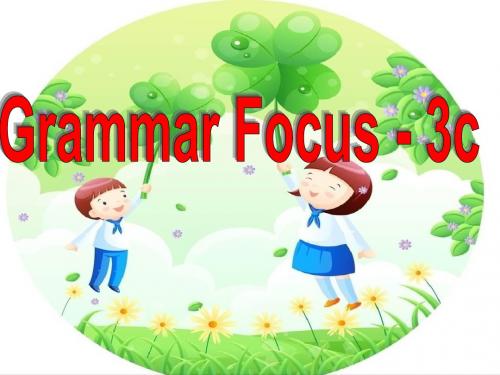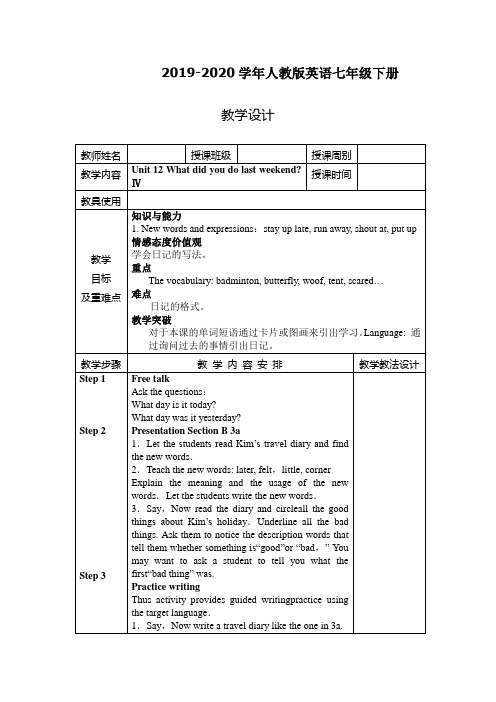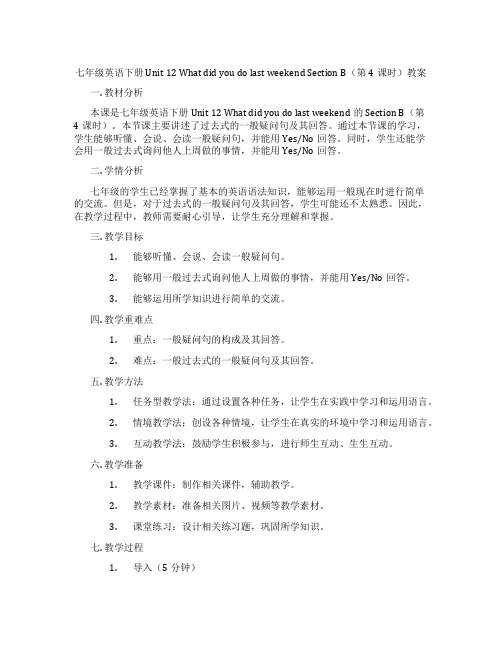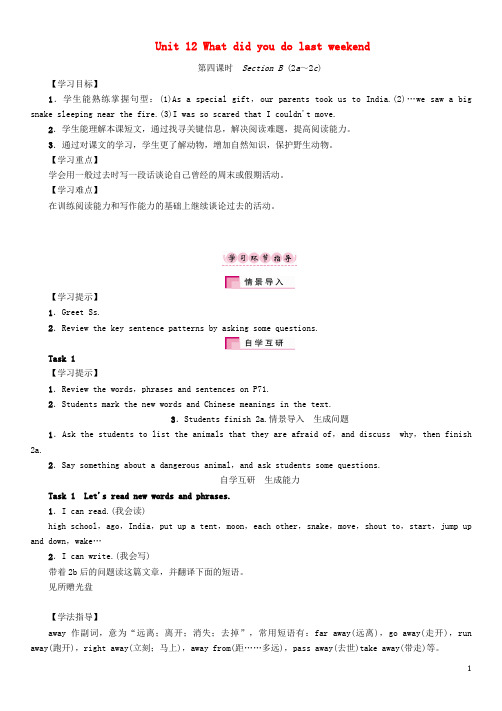2019年春七年级英语下册 Unit 12 What did you do last weekend(第4课时)Section B(2a-3b)课堂练习 (
七年级英语下册unit12_What_did_you_do_last_weekend_Section_A_2

7. 她去了农场。
____________________________ She went to the farm.
8. 她和谁一起去的?
____________________________ Who did she go with?
9. 她和她的同学们一起去的。 She went with her classmates. ____________________________
1. A: ______ What did you do last weekend? B: I played badminton on Saturday. A: Sounds fun! _____ Who did you play with? B: I played with my father. He’s really good!
阅读Grammar Focus部分,完成
下列句子。 1. 上个周末你做什么了? What did you do last weekend? ___________________________ 2. 我做了我的家庭作业。 I did my homework. __________________
_____ Why _____ were you late yesterday?
2. 特殊疑问词 + did + 动词原形 + 主语 +其 他? 昨天他做了什么事情? _____ What ____ did he do yesterday? 上个周末她参观了什么地方? ______ Where ____ did she _____ visit last weekend? 你和谁一起去的动物园? ____ Who ____ did you go to the zoo _____? with 他们什么时候到达北京的? _____ When ____ did they arrive in Beijing?
七年级英语下册Unit12Whatdidyoudolastweekend高频考点知识梳理(带答案)

七年级英语下册Unit12Whatdidyoudolastweekend高频考点知识梳理单选题1、What ________ news it is! Everyone is ________ because they can get the tickets to the basketball match for free o n the Internet.A.surprise; surprisedB.surprising; surprisedC.surprised; surprisingD.surprising; surprise答案:B句意:这是多么令人惊讶的消息啊!每个人都很惊讶,因为他们可以在网上免费获得篮球比赛的门票。
考查形容词的用法。
surprise意想不到(或突然)的事,令人惊奇的事;surprised惊讶的;surprising令人吃惊的。
根据“What…news it is! ”可知,本句为感叹句,使用形容词surprising作定语修饰名词news;根据“Everyone is”可知,此处描述人的感受,使用形容词surprised作表语。
故选B。
2、I saw Tom ________ with a dog when I walked past his house yesterday.A.is playingB.to playC.playsD.playing答案:D句意:昨天我路过汤姆家时,看见他在和狗玩。
考查非谓语动词。
根据“I saw Tom…with a dog when I walked past his house yesterday.”可知,see sb. doing sth.“看见某人正在做某事”。
故选D。
3、Look at Uncle Liang’s new car. I wonder when he ________ it.A.buyB.buysC.boughtD.will buy答案:C句意:看梁叔叔的新车。
2019-2020年人教版英语七年级下册Unit 12 What did you do last w

教学内容安排
教学教法设计
Step 4
Steቤተ መጻሕፍቲ ባይዱ 5
3.Have several students read out their diaries to the class(You might want to make this activity more substantial, and set it as written homework to be collected and marked.)
2019-2020学年人教版英语七年级下册
教学设计
教师姓名
授课班级
授课周别
教学内容
Unit12Whatdid youdo lastweekend?Ⅳ
授课时间
教具使用
教学
目标
及重难点
知识与能力
1. New words and expressions:stay up late, run away, shout at, put up
Groupwork
This activity gives students listening and speaking practice using the target language.
1 Say, Now you can talk about a real vacation or an imaginary one. The other students can ask you questions. You can use the diary you wrote for activity 3b if you want.
3. Move around the room, offering vocabulary and pronunciation support as needed.
七年级英语下册 Unit 12 What did you do last weekend Secti

七年级英语下册 Unit 12 What did you do last weekend Section B(第4课时)教案一. 教材分析本课是七年级英语下册Unit 12 What did you do last weekend的Section B(第4课时)。
本节课主要讲述了过去式的一般疑问句及其回答。
通过本节课的学习,学生能够听懂、会说、会读一般疑问句,并能用Yes/No回答。
同时,学生还能学会用一般过去式询问他人上周做的事情,并能用Yes/No回答。
二. 学情分析七年级的学生已经掌握了基本的英语语法知识,能够运用一般现在时进行简单的交流。
但是,对于过去式的一般疑问句及其回答,学生可能还不太熟悉。
因此,在教学过程中,教师需要耐心引导,让学生充分理解和掌握。
三. 教学目标1.能够听懂、会说、会读一般疑问句。
2.能够用一般过去式询问他人上周做的事情,并能用Yes/No回答。
3.能够运用所学知识进行简单的交流。
四. 教学重难点1.重点:一般疑问句的构成及其回答。
2.难点:一般过去式的一般疑问句及其回答。
五. 教学方法1.任务型教学法:通过设置各种任务,让学生在实践中学习和运用语言。
2.情境教学法:创设各种情境,让学生在真实的环境中学习和运用语言。
3.互动教学法:鼓励学生积极参与,进行师生互动、生生互动。
六. 教学准备1.教学课件:制作相关课件,辅助教学。
2.教学素材:准备相关图片、视频等教学素材。
3.课堂练习:设计相关练习题,巩固所学知识。
七. 教学过程1.导入(5分钟)利用图片或视频引导学生谈论过去的事情,激发学生的学习兴趣。
2.呈现(10分钟)展示一般疑问句的图片,引导学生说出一般疑问句,并给出肯定和否定的回答。
同时,让学生观察一般疑问句的构成,总结规律。
3.操练(15分钟)分组进行角色扮演,让学生模拟对话,练习一般疑问句的提问和回答。
教师巡回指导,纠正发音和表达错误。
4.巩固(10分钟)设计课堂练习,让学生填空、改写句子等,巩固一般疑问句的用法。
七年级英语下册 Unit 12 What did you do last weekend(第4课时)

Unit 12 What did you do last weekend第四课时Section B (2a~2c)【学习目标】1.学生能熟练掌握句型:(1)As a special gift,our parents took us to India.(2)…we saw a big snake sleeping near the fire.(3)I was so scared that I couldn't move.2.学生能理解本课短文,通过找寻关键信息,解决阅读难题,提高阅读能力。
3.通过对课文的学习,学生更了解动物,增加自然知识,保护野生动物。
【学习重点】学会用一般过去时写一段话谈论自己曾经的周末或假期活动。
【学习难点】在训练阅读能力和写作能力的基础上继续谈论过去的活动。
【学习提示】1.Greet Ss.2.Review the key sentence patterns by asking some questions.Task 1【学习提示】1.Review the words,phrases and sentences on P71.2.Students mark the new words and Chinese meanings in the text.3.Students finish 2a.情景导入生成问题1.Ask the students to list the animals that they are afraid of,and discuss why,then finish 2a.2.Say something about a dangerous animal,and ask students some questions.自学互研生成能力Task 1Let's read new words and phrases.1.I can read.(我会读)high school,ago,India,put up a tent,moon,each other,snake,move,shout to,start,jump up and down,wake…2.I can write.(我会写)带着2b后的问题读这篇文章,并翻译下面的短语。
2019-2020年人教版英语七年级下册Unit 12 What did you do last w

教师姓名
授课班级
授课周别
教学内容
Unit12Whatdid youdo lastweekend?Ⅱ课时
授课时间
教具使用
教学
目标
及重难点
知识与能力
1. Match the vocabulary:shout, fly, move, start
Master and use:How was your vacation?how were the beaches?Where did you go?
教学步骤
教学内容安排
教学教法设计
Step 4
Step 5
A:where did you go?
B: I went to…
A: What was the weather like?
B: It was hot and humid.
Practice
Say:First fill in the chart with the information about your last vacation,Say where you went,what the weather was like, what you ate,and what else you did.As students fill in the chart move around the classroom, monitoring progress and offering help as necessary。
A: I ______ at home (stay)
B: What ______you _______?(do)
A:Nothing much.
B: Why ______ you _______at home?(stay)
七年级下册英语unit 12 what did you do last weekend 知识点总结(单词,短语,句型,语法)
Unit 12 What did you do last weekend?【短语归纳】1.do my homework 做作业2.go to the cinema 去看电影3.go boating 去划船4.by the lake 在湖边5.go to the beach 去海滩6.play badminton 打羽毛球7.visit my grandma 看望我奶奶8.study for the English test 为英语测验而学习备考9.the Natural History Museum 自然历史博物馆10. kind of 有点儿11.stay up 深夜不睡,熬夜12. give back 归还13.be afraid 害怕14. play the guitar 弹吉他15.go to the library 去图书馆16. in a swimming pool 在游泳池里17. shout at… 冲……大声叫嚷18. high school 高中,中学19.fly kites 放风筝、20. go camping 去野营21.put up 搭建22 .make a fire 生火23.tell stories 讲故事24 .each other 互相25.go to sleep 入睡26.get a surprise 吃惊27.shout to… 呼喊……喊叫…… 28.up and down 来来回回;上上下下29.wake…up 把……弄醒30.do my homework 做我的家庭作业31.on Saturday morning 在星期六早上32.have a good weekend 周末过得愉快33.the next morning 第二天早上34.work as 以……身份而工作35.run away 跑开36.move into … 移进……【用法集萃】1. go + doing 去做某事2. play + 球类玩……球3. 时间段+ ago ……前4. keep + sb. / sth. + 形容词/ 副词/ 介词短语使……保持……5. so + 形容词/ 副词+ that 句子如此……以至于……6. see sb. doing sth. 看见某人正在做某事7. let sb. do sth. 让某人做某事8. start to do / doing sth. 开始做某事【经典范文】I had a busy weekend. On Saturday morning, I did my homework, and then I played computer games. In the afternoon, I visited my grandmother. We talked for a long time.On Sunday morning, I cleaned my room and did some reading. Then I cooked for m parents. In the afternoon, I watched a football match on TV and listened to music. I had a good time.知识点解析1. 表示““过去”的时间。
人教版英语七年级下册Unit 12听力原文及翻译
Unit 12 What did you do last weekend?Section A, 1bBob: Hey, Lucy.你好,露西。
Lucy: Hi, Bob.你好,鲍勃。
Bob: How was your weekend?周末过得怎么样?Lucy: It was great.很好。
Bob: So, what did you do?那你都做什么了?Lucy: Well, on Saturday morning, I played badminton. In the afternoon, I went to the beach, and at night, I went to the cinema.周六上午我打了羽毛球,下午我去了沙滩,晚上去看了电影。
Bob: Cool. What about Sunday?不错。
周日呢?Lucy: In the morning, I camped by the lake with my classmates. In the afternoon, we went boating, and at night, I did my homework.上午我和同学在湖边露营。
下午,我们去划船,然后晚上我做了作业。
Section A, 2a, 2bTeacher: So, did everyone have a good weekend?大家周末过得好吗?Students: Yeah, we did, Ms. Clark!是的,很好,克拉克女士!Teacher: Good. What did you do last weekend, Becky?很好。
贝姬,上周末你做什么了?Becky: I visited my grandma, and I did my homework.我去看我祖母,然后做了作业。
Teacher: Great. And how about you, Carol?不错。
七年级英语下册Unit12Whatdidyoudolastweekend典型例题(带答案)
七年级英语下册Unit12Whatdidyoudolastweekend典型例题单选题1、You bought the last ticket for the concert. How ____ you are!A.sweetB.luckyC.strangeD.funny答案:B句意:您买了演唱会的最后一张票。
你真幸运!A. 甜的;B. 幸运的;C. 陌生的;D. 有趣的;根据句意理解可知,“买到最后一张票是幸运的”,故选B。
2、 Hurry up, kids! The school bus is coming. We have ______ time left.A.fewB.a fewC.littleD.a little答案:C分析:【考点定位】:考查代词。
试题分析:句意:孩子们,快点!校车就要来了。
我们没有时间了。
考查代词few与little的区别。
首先,few修饰可数名词,little修饰不可数名词。
句中 time是不可数名词,排除A,B。
再根据题意“Hurry up”可知表示否定意思“几乎没时间”,a little有一些,little几乎没有;故选C。
3、—Who cleaned the room yesterday?—Nick ________.A.cleanedB.didC.doesD.was答案:B句意:——昨天谁打扫的房间?——Nick打扫的。
考查助动词。
clean打扫,实义动词;did做,实义动词;还可以作助动词;does是第三人称单数形式;was 是。
根据语境可知,该空代指上文提到的“cleaned the room”,是一个过去的动作,应用助动词did。
故选B。
4、There ________ a small lake in the garden two years ago.A.isB.areC.wasD.were答案:C句意:两年前,花园里有一个小湖。
考查be动词。
根据“two years ago”可知,句子时态为一般过去时,主语为单数“a small lake”,be动词应用was。
人教版七年级下册英语Unit12What-did-you-do-last-weekend?知识点总结
七下Unit 12 What did you do last weekend?一、Important Phrases:1.go to the cinema 去影院★=go to the movies2.go boating/camping 去划船/野营★summer camp 夏令营3.camp by the lake 在湖边野营★by the pool在池边4.go to the beach 去海滩★on the beach 在沙滩上5.play badminton 打羽毛球play+球类/棋类名词(不加冠词)6. study for the test 备考★test=exam7.feed some sheep/cows喂羊/牛★feed(fed)on...以..为食,feed with...用...喂养8. work as a guide 做导游工作★work as +职业从事某工作9. at the Natural History Museum 自然历史博物馆★nature(n.不可数)大自然-natural(adj.)自然的10. over 200 kinds of butterflies 200多种蝴蝶★over=more than 超过11.living habits 生活习惯★make a living 谋生;eating habits饮食习惯12.kind of tired 有点累★kind of = a little13. stay up late 熬夜★stay at home 待在家,stay away from 远离,lately(adv.)最近地14.sleep early 早睡★sleepy 困的,asleep睡着的15.a family of mice 老鼠一家★mouse(单)-mice(复)16.be afraid of sth./to do 害怕★afraid=scared17.run away 跑开★take away 带走,put...away 把某物收拾好,give away 捐赠18. climb onto one’s back 爬上某人的背19. shout at/to sb.冲某人大叫★shout out 大喊出20. a second language 第二语言★mother tongue 母语21.fly a kite放风筝22.do something interesting 做有趣的事★修饰不定代词,adj.后置:anything special23.finish high school 中学毕业★finish doing sth 完成做某事24.a special gift一特殊礼物★gift=present25.take us to India 带我们去印度26.take a long bus ride 坐很久的公交车27.put up our tents 搭帐篷★put up:搭建,举起,张贴28.make a fire生火29.cook food on the fire 在火上做饭★on an open fire 明火,篝火30.tell cach other stories 互相讲故事★tell a lie 说谎,tell a joke 讲笑话31.keep sb.warm 使某人保持暖和32.sit under the moon 坐在月光下★moonlight月光,moon cake月饼33.so.......that.......如此...以致于...34.get a surprise 吃惊35. look out of...向外看★look out 小心,look for寻找,look after 照顾36. jump up and down 跳上跳下37. move into the forest 进入森林38. wake sb up叫醒某人★wake up醒来,awake醒着的39. read a book about history 读一本历史书★read...to sb给某人读...40.see an interesting talk show 看有趣的脱口秀二、Key Language Points:1.Where did you go last weekend? What did you do last weekend?上周末你去了哪里?上周末你做了什么?一般过去时的特殊疑问句:1)特殊疑问词+did+主语+v.(原)+其他?如疑问词作主语,则陈述语序,如:Who bought you this new dress?谁给你买的新裙子?2)特殊疑问词+was/were+主语+其他?Where were you last night?昨晚你在哪里?2.----Who visited her grandma? -----Becky did.为避免重复,常用do,does,did,so等代替前文提到的内容。
- 1、下载文档前请自行甄别文档内容的完整性,平台不提供额外的编辑、内容补充、找答案等附加服务。
- 2、"仅部分预览"的文档,不可在线预览部分如存在完整性等问题,可反馈申请退款(可完整预览的文档不适用该条件!)。
- 3、如文档侵犯您的权益,请联系客服反馈,我们会尽快为您处理(人工客服工作时间:9:00-18:30)。
Unit 12 What did you do last weekend?第4课时Section B(2a—1.高的(地) adj.& adv.__high__2.以前adv.__ago__3.印度n.__India__4.月亮n.__moon__5.惊奇;惊讶n.使吃惊v.__surprise__6.蛇n.__snake__7.移动v.__move__8.开始;着手v.__start__9.跳;跃v.__jump__10.弄醒;醒v.__wake__11.到……里面;进入prep.__into__12.森林n.__forest__13.耳朵n.__ear__14.中学__high__school__15.搭起;举起__put__up__16.互相;彼此__each__other__17.吃惊__get__a__surprise__18.对……大声喊叫__shout__to…__19.上上下下;起伏__up__and__down__20.把……弄醒__wake…__up__重点词汇1.ago adv.以前表示“在现在以前”,以现在为基准,与一般过去时连用,不可单独作状语。
【拓展】与before的用法辨析:before表示“在过去以前”,以过去为基准,常与完成时或一般过去时连用,可单独作状语。
2.surprise n.惊奇;惊讶v.使吃惊作名词时的常用短语有:get a surprise 吃惊give sb.a surprise 给某人一个惊喜in surprise 惊讶地to one's surprise令某人惊讶的是3.start v.开始;着手其同义词为begin。
也可作名词,表示“开始;开端”。
【拓展】start/begin的常用短语:start/begin to do/doing sth.开始做某事start/begin with sth.以某事开始start/begin sth.创办某物4.put up搭起;举起【拓展】与put相关的短语:put on 穿上(衣服)put away 放好,把……收起来put down 放下,写下put off 延期,拖延put out 扑灭,伸出put up with 忍受,容忍5.each other相互;彼此相当于one another。
each other为不定代词,在及物动词之后可直接用作宾语,而在不及物动词之后,则要借助介词。
each other可加's构成所有格。
6.shout to对……大声喊叫多指因距离远而不得不大声喊叫(否则对方无法听见),不带生气等感情因素。
【拓展】与shout at的用法辨析:shout at多指因生气等而非善意地对某人吼叫。
7.up and down上上下下;起伏在句中作状语。
类似短语:day and night 日日夜夜;here and there 到处。
重点句型But I was so tired that I went to sleep early.但是我太累了,所以早早就睡着了。
so+adj./adv.+that从句,意为“如此……以至于……”,是固定句型。
【拓展】so… that… 句型还可以和too… to… 太……而不能……(to后接动词原形)和not… enough to… 不够……去……(to后接动词原形)转换。
如:She is so young that she can't go to school.→She is too young to go to school.→She isn't old enough to go to school.Ⅰ.用方框中所给短语的适当形式填空。
put up high school up and downwake up get a surprise1.ler __woke__up__ his son at 6:30 this morning.2.My aunt is an excellent history teacher in a __high__school__.3.The farmer __put__up__ a house for his chickens last year.4.When she opened the gift box, she __got__a__surprise__.5.Linda told her children not to jump __up__and__down__ on the bed.Ⅱ.根据汉语意思完成句子,每空一词。
1.别朝窗外看。
请认真听我说。
Don't __look__ __out__ __of__ the window.Please listen to me carefully.2.她吓坏了,于是开始往水里跳。
She was __scared__.Then she __started__ __to__ __jump__ __into__ water.3.我看到苏珊正在房间里弹钢琴。
I __saw__ Susan __playing__ __the__ __piano__ in the room.4.蛇虽然听不见,但是它们能感觉到东西在动。
Snakes can't hear anything, but they can __feel__ things __moving__.5.作为朋友,我们应该互相帮助。
As friends, we should help __each__ __other__.Ⅲ.单项选择。
(B)1.Don't shout ________ others.It's not polite(礼貌).A.of B.toC.from D.out(B)2.________ a special gift, my parents took me to Hainan on vacation. A.ForB.AsC.WithD.On(A)3.Two hours ________, they went out for dinner together.A.agoB.beforeC.thenD.last(A)4.In the evening, they make a fire ________ them warm and cook food ________.A.to keep; onB.keep; onC.to keep; atD.keep; at(C)5.Teresa is ________ nervous ________ she can't talk in front of the class. A.such; thatB.too; toC.so; thatD.too; thatⅣ.阅读理解。
How Was Your Weekend?DavidJillMarkAnna(D)1.David talked with his friends about ________.A.the movieB.the restaurantC.their favorite foodD.their favorite sports(A)2.Why did Jill stay at home last weekend?A.The weather was bad.B.She liked watching TV.C.She liked reading at home.D.She needed to do her homework.(C)3.Mark thought his weekend was ________.A.boringB.excitingC.greatD.interesting(B)4.What does the underlined word “except” mean in Chinese?A.还有 B.除了C.分开 D.比较(A)5.Which of the following is TRUE?A.Leo had a birthday party last Saturday.B.Anna thought she had a happy weekend.C.Mark met some classmates last weekend.D.David didn't like the food in the restaurant.Ⅴ.任务型阅读。
Dear Jenny,I had a great weekend.On Saturday, I went camping with my cousins in a small village.The village was far, so we drove there.It took us six hours to get there.There was a beautiful lake in the village and we put up our three tents by the lake.In the evening, we made a fire.Then we sat around the fire and told interesting stories.The next morning, we took photos in the village.People there were very friendly.Some of them asked us to their homes and cooked good food for us.I had a lot of fun.I got home on Sunday evening.We all felt very tired, but we were happy.How was your weekend? Write to me soon.Sam根据短文内容,回答下列问题。
1.Where did Sam go camping with his cousins?__In__a__small__village.__2.How did Sam go there?__By__car.__3.How many tents did Sam and his cousins put up? __Three./3.__4.How long did Sam and his cousins stay there? __For__two__days.__5.How did Sam and his cousins feel?__They__felt__very__tired__but__happy.__。
